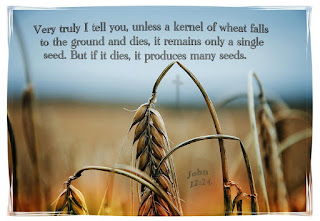Oh. My. ... !
I could think of no other heading for this post, than "Oh. My. ... !" Oh, my word. Oh, my goodness. Oh, my God.
John 12:24 puzzled me, but I left it in God's court and didn't try to understand.
For years, I've wanted to garden well. And for years, I've dug into God's word. So it puzzled me that our heavenly maker, creator of the universe, the one who waited billions of years and counted it all as only a "day" to birth mankind and supply us with everything needed for living (including millions of years in dinosaur fuel) — that He would just up and say a seed dies in order to produce.
But that is not what He has said.
Of course, seeds do not completely die before taking root. Seeds only sleep. Seeds hibernate, so to speak. And when temperature and moisture are right, they awaken and set down their roots.
Yet, that's not all seeds. All seeds are not blessed to cosily nestle beneath the cover of good soil and optimal weather. All seeds don't get to dry out only so much, not enough to die but only enough to sleep. All seeds do not wake up and prosper.
In fact, a majority of seeds only die. A majority are eaten by fowl, killed under thorns, or scorched by the sun, as in Jesus' parable of the sower and the seeds. (We otherwise would be pretty overgrown with plantlife!)
Only a blessed few seeds nestle cosily into plots of earth that are able to bring forth new roots.
But in John 12:24, those are not the seeds Jesus is describing. And that's where I say, "Oh, my God."
Jesus is telling us about the great many seeds that fall onto the ground. Some translations of the Bible change God's meaning, making it seem as if Jesus is talking about seeds that fall and nestle in the soil. But Jesus is saying no such thing in this passage. In John 12:24, He only speaks of the seed that falls to the ground, the seed out in nature that falls onto earth and, under sunlight, dries out and completely dies.
In a wheat field that no one harvests, most seeds will only die. And those seeds that die, those not eaten by birds and cattle, will help to enrich the soil. As when tree leaves fall and decay, so do dead seeds enrich the earth.
Such is our cycle of life.
Now, all of this is about our physical lives, not our lives in spirit. But isn't it amazing how Jesus has taken a moment to be a science and stewardship teacher?
He is not speaking of seeds that sleep and then awaken to produce other seed-bearing plants. But He is speaking of seeds that die and physically leave something that helps the next crop and the next crop to grow richly.
That sounds a like when elders provide rich lessons for one generation after another. That also sounds like Proverbs 13:22: "A good man leaves an inheritance to his children's children, but the sinner's wealth is laid up for the righteous."
Oh, how we serve God, who provides.
But now deepening the science lesson a little, we recognize how everything living in flesh depends upon the decay of other organisms. If birds and other animals out in nature never physically died, never were ant-eaten, and never decayed, we would be a world full of corpses instead of a world teaming with life.
Every tree depends not only on the air God gives, but also upon the decay in rich soil. And we can thank God that, although we are not long lived, He promises more patience with us than with the dinosaurs.
[Note: I hate Satan. I will be relieved when he leaves these heartfelt posts alone. ... And to any child involved: This is not a toy. ... "Help" is spiritual. "Enablement" is not. Would you rather God help you? Or would you rather the world enable you? ... The choice is yours. ... Satan made me do it, isn't an excuse.]

.jpeg)


Comments
Post a Comment